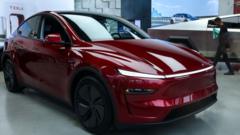As Tesla's ambitions in India unfold, analysts question whether the company can thrive in a market dominated by lower-cost electric vehicle manufacturers.
**Can Tesla Navigate India’s Price-sensitive EV Market?**

**Can Tesla Navigate India’s Price-sensitive EV Market?**
Tesla Makes Moves Toward India, But Will Price Point and Conditions be Viable?
Tesla is making strides toward entering the Indian market by hiring for various positions in Delhi and Mumbai, signaling its commitment to exploring opportunities in Asia's third-largest economy. With its sleek, high-tech electric vehicles, Tesla hopes to capture a share of the EV market, which faces intense competition primarily from local manufacturers. However, the critical issue looms: Can Tesla win over Indian consumers who are price-sensitive and accustomed to far cheaper alternatives?
Currently, Tata Motors leads India's EV sector with over 60% market share, followed by MG Motors and Mahindra. In stark contrast, Tesla's entry-level model is expected to be priced around $40,000, positioning it as a luxury option in a market where local EVs cost significantly less—often half that price. This pricing disparity raises questions about Tesla's ability to attract Indian buyers and achieve substantial volume sales without rolling out a more affordable model tailored to local needs.
Moreover, India's varied road conditions pose additional challenges for Tesla, whose vehicles typically have low ground clearance. Adapting existing models for Indian terrain could escalate manufacturing costs, making the prospect of entering this market seem less appealing for Tesla, especially given its potentially small consumer base.
Despite the current struggles of electric vehicles to gain significant market share in India—accounting for less than 3% of total passenger vehicle sales—India's government is actively working to create a conducive environment for EVs. The ambitious vision aims to have a substantial percentage of the vehicle fleet transitioning to electric by 2030, supported by one of the most generous subsidy structures globally for electric automobiles, reaching up to 46% of the price of the best-selling model.
India's recent policy changes have also eased import duties for EVs, allowing companies like Tesla to have a lower tax burden on imported models, as long as they commit to local production. However, foreign manufacturers face scrutiny about whether their entry will undermine local players.
Existing domestic manufacturers appear unfazed by Tesla's impending arrival, emphasizing that increased competition will help strengthen the EV market ecosystem. Despite these assurances, Tesla's advanced technology, robust infrastructure, and brand prestige present significant challenges to local competitors.
The luxury car segment in India is seeing growth, which may benefit Tesla's market entry. For younger Indians, owning a Tesla could signify status and innovation. However, uncertainties surrounding Tesla’s commitments for local manufacturing and supply chains raise concerns about how swiftly the brand can establish a production footprint in the country.
As discussions continue regarding trade policies and tariffs—exacerbated by diplomatic sentiments from figures like former President Trump—it remains to be seen whether Tesla will prioritize India for manufacturing or if the focus will simply be on building its brand for the affluent segment. One thing is clear: as Tesla introduces showrooms, the pathway toward a manufacturing facility looks far more complex and challenging.
Elon Musk, Tesla, India, Electric vehicles, Market challenges























